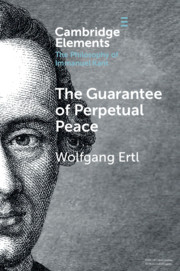Refine search
Actions for selected content:
2 results
9 - The Emerging Phonological Standard
- from Part II - Tracking Change in the History of English
-
-
- Book:
- The New Cambridge History of the English Language
- Published online:
- 23 October 2025
- Print publication:
- 23 October 2025, pp 246-270
-
- Chapter
- Export citation

The Guarantee of Perpetual Peace
-
- Published online:
- 04 March 2020
- Print publication:
- 26 March 2020
-
- Element
- Export citation
